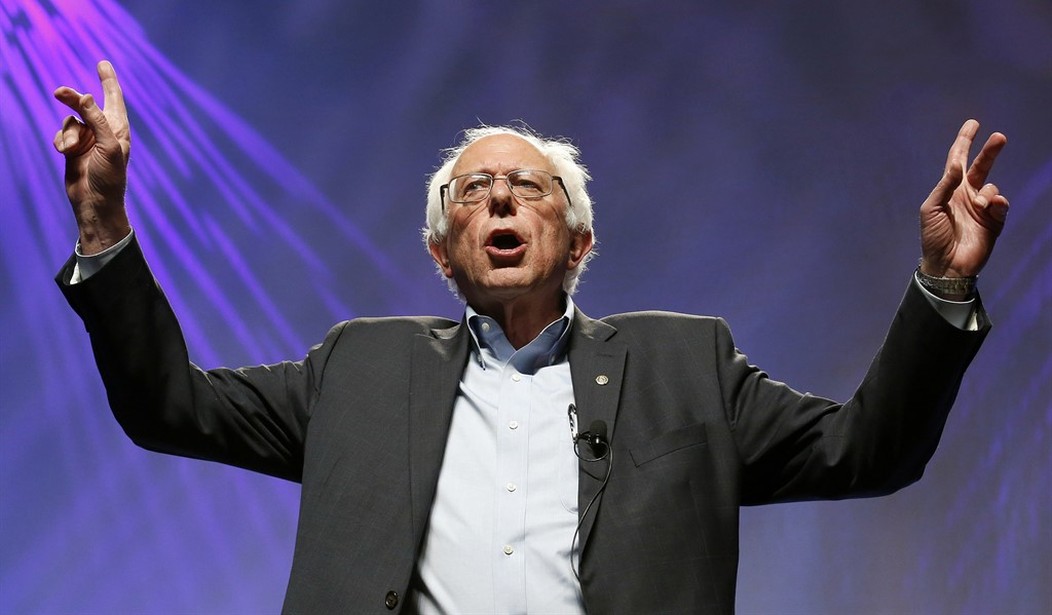Editor's note: This column was co-written by Economics21's Patrick Holland.
Progressives are experiencing a renaissance. First, Senator Elizabeth Warren (D-MA) was chosen as their new hero, and now Senator and Democratic presidential candidate Bernie Sanders (I-VT), who wears his Democratic socialist label with pride, has energized voters who are dissatisfied with former Secretary of State Hillary Clinton.
As his popularity in polls rises, it is worth examining what a potential Sanders presidency would mean for the economy. Even though Sanders does not have much of a chance of winning the nomination, much less the presidency, his policy ideas are likely to influence future debate because he is driving Hillary Clinton to the left.
So what would a Sanders economy look like?
Labor
Sanders’s presidential campaign has focused primarily on income inequality.
According to Bernienomics, raising the minimum wage to $15 an hour would prevent greedy capitalists from exploiting their workers and paying below a “living wage.” Numerous studies have shown that increasing the minimum wage raises unemployment rates. Though some workers might see an increase, others, especially the low-skilled and young, will be out of a job.
Even unions, which make up nine out of Sanders’s top ten donors, understand the costs of raising the minimum wage. When Los Angeles committed to enacting a $15 minimum wage, as Sanders suggests should happen nationwide, the AFL-CIO lobbied voraciously for an exemption for collectively-bargained workplaces.
Education
One reason for Sanders’ popularity among millennials is his commitment to fighting for European style “free college” to help low-income students afford college. But free college may do more harm to these individuals than good. It does nothing to address the reason for growing student loan debt, which is increasing federal student aid and raising tuition. Of the $70 billion in new spending on subsidized college that Sanders is hoping for, over $56 billion will go to students from families with above-average incomes. “Free college” is a subsidy for children of upper- and upper-middle-class Americans, not an aid for the poor.
Recommended
Many low-income Americans do not attend college because the public school system is failing them. Sanders’s plan to fix America’s public schooling system is twofold: pay teachers more and expand pre-schooling. His plan leaves out the most effective way to improve failing schools—choice. While states such as Nevada have enacted innovative measures, such as school choice, education savings accounts, and charter schools, Sanders has opposed these measures consistently. In 1998, he voted against allowing the Washington, DC school system to experiment with a voucher program, even though the district was one of the lowest-performing in the country.
Regulation
Sanders supports the Environmental Protection Agency’s CO2 emission standards, even though these will raise the costs of energy and manufacturing. Sanders also supported allowing the Federal Communications Commission to regulate the internet as public utility, and he even
Sanders does not just want to use regulation as a tool keep Americans safe, he wants to use it to reduce inequality by attacking Wall Street. In May, Sanders promised to break up big banks saying, “if an institution is too big to fail, it is too big to exist.” Rather than addressing Washington’s incentives that create “too-big-to fail” banks, Sanders would take a regulatory sledgehammer to Wall Street and add additional layers of bureaucratic oversight.
Taxes
Sanders wants to raise taxes on the rich as much as possible, even if doing so lowers overall tax revenue through decreased economic growth. A central point of Bernienomics is that economic policies should not be created “for the sake of growth.”
Although Sanders is yet to release an official tax plan, he has stated his desire to tax the rich at more than a 50 percent income tax rate. Sanders also recently proposed a massive increase in the estate tax in order to prevent families from passing down wealth from one generation to the next. Since the wealthiest Americans can afford estate planning, this tax burden would fall most heavily on small family businesses.
Sanders has also pointed out that he would use the tax code to fight Wall Street. He wants to adopt what many call “the Robin Hood tax” to fund his free college plan. The proposal is a 0.5 percent surcharge on almost every stock transaction or trade. However, this policy would have unintended consequences, such as taxing disability trust funds, which are the main source of income for many handicapped Americans.
Sanders also wants to increase capital gains tax rates. If enacted, President Obama’s recent proposal to raise the capital gains tax is projected to shrink GDP by 0.8 percent and reduce wages across the economy. Sanders’ proposal to raise rates to the same level as the income tax, even though capital gains income has already been previously subjected to the corporate income tax, is more radical than President Obama’s and the costs would be even higher.
Entitlements
Sanders believes that Social Security is the “most successful government programs in American history,” so it only makes sense that he wants to expand it. But by 2050, Social Security and Medicare taxes will rise to 32 percent of wage income if the programs are not brought into balance. Instead of putting in place moderate reforms to adjust benefit levels and the retirement age, Sanders is forging ahead with his plan to expand these programs by increasing taxes.
Sanders is also a major proponent of a single-payer health care system. He wants to model the U.S. healthcare system on Medicare, which is experiencing out-of-control cost increases. In addition to higher healthcare spending, socialized medicine would reduce doctor choice, create longer lines, and decrease the quality of care.
It is not likely that Candidate Sanders will become President Sanders. However, his growing popularity and influence could drive Clinton to the left. She might not only jump on his bandwagon, but also win the election. If Bernienomics influences Clintonomics, it will spell disaster for the economy.

























Join the conversation as a VIP Member